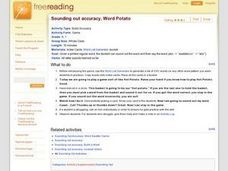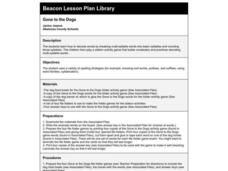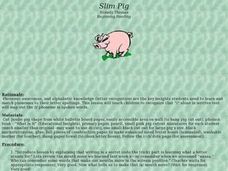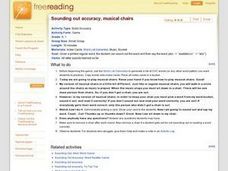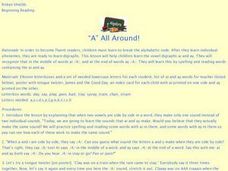Curated OER
Sounding out accuracy, Word Potato
Learning to sound out CVC words can be fun, when you turn skills practice into a game. Kids play "Hot Potato" by passing a bucket filled with phonetically regular words on cards. When the music stops, students choose a word and sound it...
Curated OER
Gone to the Dogs
Approach vocabulary through decoding and chunking. Your class breaks up words into basic syllables or chunks then engages in a decoding activity. Useful for a variety of language levels and grades, just modify to fit your class.
Curated OER
What Does PAN Mean?
Do your middle school scholars need practice decoding words while reading or for spelling? The root word pan is the focus of a nine-step lesson that asks learners to discover ways to figure out the meaning of words built on a root that...
Curated OER
Slim Pig
Beginning readers study the short /i/ sound. First they determine how the mouth moves when they say the target words in a tongue twister. They complete letterbox activities by making words with the short /i/ before reading What Is It and...
Curated OER
Icky Insect Is In Icky Sticky Ink
Practice the strategy of letter-sound correspondence when identifying the short vowel /i/ sound in written and spoken words. The teacher recites the tongue twister "Icky insect is in icky sticky ink," while listeners repeat. Letter boxes...
Curated OER
Vowel Sounds
This plan aims to increase the reading proficiency of your fourth grade class. While no materials are provided, a list of activities to practice are included. Various activities include creating songs for short vowel sounds, using cue...
Curated OER
Spelling Counts!
Play a game to practice spelling and math. By assigning a numerical value to each letter of the alphabet, you can engage learners in "spy" coding and decoding activities that reinforce grade-appropriate spelling and math skills....
Curated OER
Reading Bugs
Review the phonemic sounds of the alphabet letters before examining how to blend letter sounds to make a word. During this teacher-modeled lesson, learners make word bugs out of three phonemes that blend together. As an assessment, read...
Curated OER
The Creaky Door Says "ehhhh"
Study the long vowel sound /e/, as in a creaky door noise. Children repeat the sound and learn a chant. They use letters in letterboxes to make words with the /e/ sound before reading a book and writing a message about their favorite...
Book Units Teacher
Skill Lessons – Prefixes and Suffixes
Sometimes the best way to understand a concept is to break it down. Young vocabulary pupils work with word parts in a hands-on activity that prompts them to connect flash cards with affixes to their root and base words....
Curated OER
Sounding out accuracy, Musical Chairs
Here is a great spin on the classic game, Musical Chairs! Instead of fighting to get the last chair when the music stops, learners will need to read a CVC word to stay in the game. They walk around, whoever is near the word bucket when...
Curated OER
Make a Word: Long U by Starfall
Students explore language arts by participating an on-line grammar activity. In this letter U lesson, students discuss the uses for the letter U in the English language and the different sounds that can be made from the vowel. Students...
Curated OER
Alphabet Poems
Develop fluency with a variety of works. Help kindergartners use multiple strategies to understand text and decoding. They will create an alphabet poem book on Kid Works 2 to illustrate and write their own poem. In the end, they will...
Curated OER
Alphabet Organizer
Learners practice organizing their vocabulary words in an online organizer tool. In this vocabulary lesson plan, students read a text and take notes. Additionally, learners organize their vocabulary words into an online "Alphabet...
Curated OER
"A" All Around
Spell and read words containing ai and ay. First and second graders identify vowel digraphs in written and spoken language. After a brief discussion on the combinations of letters that comprise digraphs, they practice reading and...
Curated OER
Word Wizards: Students Making Words
Students explore patterns in words and how to make new words by adding or changing the sequence of letters
Curated OER
Antonyms, synonyms and homophones
Shed light on what antonyms, synonyms, and homophones are. In this lesson, upper elementary schoolers create pairs using an antonym, a homophone, and/or a synonym. Then they play an antonym matching game.
Curated OER
Aches and Pains
Being able to distinguish between short and long vowel /a/ sounds is an important skill for young readers. They are introduced to the vowel-consonant-e pattern that changes short vowel sounds into long vowel sounds. They practice reading...
Curated OER
Wade Swayed At the Masquerade
Students practice reading words with vowel patterns that change the sound of the vowel. After reviewing the short vowel sound /a/, they are introduced to the vowel-consonant-e pattern that changes the short vowel sound into a long vowel...
Curated OER
Isabelle the Icky Iguana
Students practice the sound and spelling of the short vowel /i/. They identify the short /i/ sound in spoken and written words. The tongue twister "Isabelle iguana is in her igloo," and "Tin Man Fix It," along with Elkonin letter boxes...
Curated OER
Oh My
Students are introduced to the vowel-consonant-e patter that changes short vowel sounds into long vowel sounds. They distinguish between the short vowel sound for o and the long vowel sound for o. Students practice reading and spelling...
Curated OER
Hi, My Name is A
Students distinguish between short vowel a and long vowel a. They are introduced to the vowel-consonant-e pattern that changes short vowel sounds into long vowel sounds. They practice decoding pseudo words with the vowel-consonant-e...
Curated OER
Beginning and Ending Sounds
First graders practice their letter and word recognition skills. In this initial and final sounds lesson, 1st graders participate in a classroom activity that requires them to blend phonemes into spoken words and sound out multisyllable...
Curated OER
Build it Up
First graders practice spelling words through by blending sounds with a focus on short vowels i and a. Through matching and listening activities, 1st graders replace initial and final sounds to create words they decode and read.


